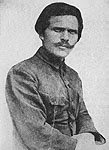AN OPEN LETTER.
Philadelphia, Pa., Aug., 1906.
Maxim Gorky, New York City.
My right to address you is that I have felt the best that your
soul has felt, and loved you for your voice that cried out of the deeps;
and that not less have I felt the shame and degradation of your conduct
as a weak and shambling creeper, since you have been in America.
Hedged about like the Russian Czar by those that have used you
and fooled you; seeker for the gifts of those who have spit in your
face; insulter of those to whom you once belonged; hedger and trimmer to
the rotten bourgeoisie of America, for the dollars you hoped to get
from them for the Russian revolution, you have not known even how to
hedge and trim; and some one should tell you so.
Are you he who wrote the apotheosis of the tramp, you who in this
city sat in the Bellevue-Stratford Hotel surrounded by the vulgar gaud
of modern riches, paid for—by whom? By those who are down in the depths
where you once were! In the closed circle which has kept away the honest
light of truth from you, and reflected your image in the magnifying
glass of hero-worship, you have not heard or seen the truth about
yourself. To tell you that truth, that is why I write.
In what character did you come here? Did you come here as a man,
or as a representative of the Russian revolution? You have acted as
neither one nor the other. If you came here as a man, perfectly free and
responsible to no one, then when Puritanic hypocrisy grew morally
indignant at your personal relations, why did you not once and for all
say, "I despise your marriage law, your marriage prostitution, your
lying morality. Myself and my beloved are above you." But you tried to
creep behind a pretense of legality, you hung on to the skirts of the
respectability, which flouted you andl her. After an attack like that
you should have stayed in the open like a man; but you went and hid like
a coward. Again, if you were of the people, truly and in the depths of
you, and free to act as you pleased, why did you please to go to the
richest hotels and sit with the bourgeois? Why, when the
poverty-stricken Russian Jews, who, and who alone, have given
nine-tenths of the money contributed to the Russian revolution from
America, when they wrote and told you your prices were too high for them
to hear your lecture, did you answer, "I am here to collect money, not
to be stared at"? You would have had twice the money at half the price.
Have you then learned so soon the art of playing the lion at two-dollar
banquets, and scorning the staircase whereby you climbed?
It is said by your apologists, among them some of those who sat
at the banquet with you, that your anomalous position was due, not to
yourself, but to your having fallen into the hands of committees of
lickspittles. In the name of Manhood, are you nothing at all yourself?
Do you not know when you are in surroundings incompatible with the
charactei of one devoted to the cause of human—not Russian only—liberty?
Are you such a helpless baby that you cannot assert yourself and tread a
self-respecting path? Can you sit at the board with those who eat the
flesh and drink the blood of the workers, and not know what you are
doing? You did that, here in Philadelphia. And you left Mme. Andreieva
in New York, or they would not have let you into that same
Bellevue-Stratford! Shame on you!
But perhaps you came here not as a man, but as a delegate. Then
why, in the name of common sense, did you not learn the nature of the
people with whom you had to deal, and act with some sort of diplomacy.
If you wanted the money of the American bourgeoisie, why did you not
study them first? Why did you act like a blunderbuss, and begin by
outraging the first article in their creed, viz.: "Let a man keep his
illicit relations secret." Why did you not master the psychology of the
American journalist, before you walked near his traps? Why did you play
your cards so stupidly as to fall foul of metropolitan newspaper
jealousy, before you had a single thousand of all that money you wanted
to get for Russia? If you undertook the errand of a diplomat, why did
you not learn the business of a diplomat?
Finally, whether as a man or as a representative, what lying
spirit put it in your mouth to call the Russian Czar an Anarchist? To
decry people who, whether right or wrong in their beliefs, have fought
and are fighting tyranny in every land, whether Russia or America;
people who have felt the lash and iron, who have gone to the scaffold,
the guillotine, and the garotte, for proclaiming the freedom of all, the
tyranny of none. You can not be so ignorant as not to know who Peter
Kropotkin is and what he teaches, and you know it has as much in common
with Czarism as light has with darkness. Is this, then, again a piece of
your "diplomacy"? Do you throw mud where all the world throws mud, in
order to get dollars again? Do you want to help the Russian revolution
at the expense of truth, of justice to those to whom it is popular to be
unjust? We, the Anarchists of America, have been ever the first to
welcome every dawnbearer over the darkness of Russian tyranny. For years
we have given our work and our money—what little we had—to push the
cause of freedom, there as here, and everywhere. We will continue to do
so, no matter what you say of us. But if you choose to blacken us, to
misrepresent us, expect from us the contempt of honest men for liars.
I have written with the bitterness of one who has had —I will not
say an idol shattered, but something akin to it. I thought you were a
fearless man, a true child of the people; and you are weak and
characterless, as a daughter of silk and velvet.
At the end of the bitterness comes an all-surgent wish, "Oh, that
he might yet shake them all off, strike out a line, clean as an
arrow-path, and walk in it among his own people,—the poor, the outcasts,
the tramps. We would forget it all,—these shameful days, this
disgusting truckling, this vane-veering, this eating of the bread of the
rich: he would be ours again!"
And I remember "The Lost Leader"—
- "Just for a handful of silver he left us,
- Just for a ribbon to stick in his coat!"
You wanted to be true to the Russian revolution, and you have been
untrue to the great revolution, which is to the other as the ocean to
the wave!
I have told you the truth.
VOLTAIRINE DE Cleyre,
517 N. Randolph street, Philadelphia, Pa
(Offener Brief an Maxim Gorki, aus Mother Earth, vol. I, 7, September 1906).











